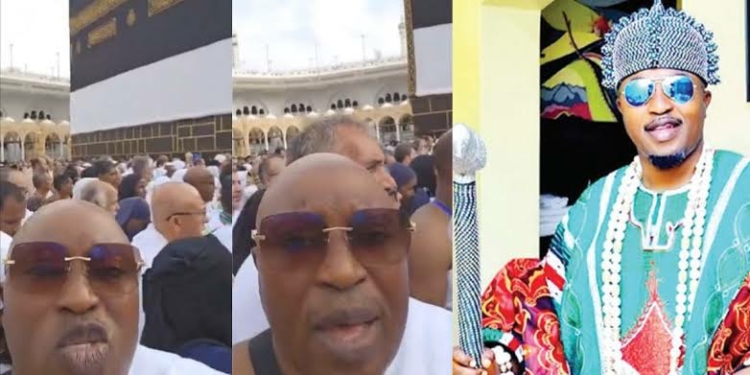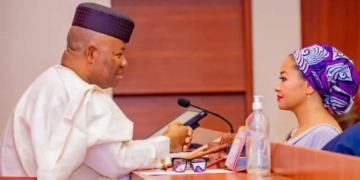In Yorubaland, the throne is sacred. Aside from the royal staff, the throne connects its occupier (the king) and the people. It is also a symbol of authority and respect because it compels the people to respect the occupier (the king). The throne and the royal staff have a special relationship with the king and the people. The throne is so powerful that if a clown or an intellectually deficient person is installed as a king, the moment he sits on the throne, he will be naturally empowered by forces holding the community together, just as the occupier is a true royal and has a date with destiny. The throne does not abandon its true occupier to reek in regret, ridicule, and mockery as a traditional ruler and spiritual leader for the community.
The sanctity of the throne must be thoroughly protected against the excesses of its occupiers. For the throne to be secured, the occupier must go through a thorough cleansing and screening because it must not be polluted. Occupiers are compelled to go through spiritual cleansing and spend a couple of days at the Ipebi, where they are taught how to behave and what characters to exhibit in public. In Ipebi, kings would have a better understanding of the core secrets of their towns, including traditions, historic sites, and how their forefathers related to them.
At Ipebi, discipline is a virtue and an important teaching that must not be missed at all. Kings don’t eat outside. Kings don’t lead a mob to the houses of their subjects. Kings do not appear in public without caps. Kings do not dance anyhow in public among others. These are true values every rational Yoruba king must display because they are not greater than values of the system that made them king. When you look at the kind of traditional rulers being paraded in public, one is forced to ask if Ipebi still exists and what they teach them there. Is the Yoruba tribe now in need of elderly people with clear heads to manage Ipebi for better products?
Barely two weeks ago, a video emerged on social media where the Oluwo of Iwo, Oba Abdulrasheed Akanbi, was seen running around without his cap in Mecca. In the video, Oba Akanbi did not only appear in public without covering his head, but he also captured the moment and posted it on his social media page. When I saw the video, I browsed through the page, and I saw a comment section bombarded by three sets of people: some Muslims who hailed him because they saw it as a plus to their religion, some Iwo natives who did not want their king to be ridiculed, and some cultural enthusiasts who expressed their worry over the act. I decided not to intervene in the matter because it would not be the first time Oba Akanbi would attempt to drag the values of a system that made him king.
I was preparing for a professional examination when a message popped on my phone’s screen. A friend who probably watched the video of Oluwo appearing in public without a cap was the one who sent the message. “Oluwo will destroy Yoruba values.” That was the message he sent. I did not bother to reply to him. I read it and continued with my preparation for examination. He later forwarded another message in which he expressed concern about my silence. Are you quiet because you’re also a Muslim? The prince queried. I did not respond again. When we met, I did not raise it either. Dear Tadenikawo, if you ever read this piece, my response to your questions is responsibly captured here.
Abdulrasheed Akanbi cannot destroy Yoruba values. He is not the first Yoruba king to visit Mecca for pilgrimage. Other kings also removed their caps, but they did not record themselves for the public to watch and judge. I have seen kings who try to avoid being recorded or captured with people’s phones. Oluwo is not the first Yoruba king to commit such an offense, but he only lacked decorum and discipline, and it is evident in the ways and manners in which he has been parading himself and clearly waging war against a system that crowned him.
Sadly, no matter how much he tries, he can only continue to prove to the public that he has been given a job or responsibility greater than his character and mental capacity. Yorubas have a rigid structure of values that cannot be ridiculed. Even though our politicians and money-bag natives have polluted the system and facilitated the crowning of people of questionable character, possibly ex-convicts, as reported by some tabloids, the Yoruba system has continually shown strength by surviving the antics of politicians and the tenures of their installed candidates of questionable character.
In Yorubaland, elders are allowed to occupy leadership positions. From Olori Ebi (the family head) to Iya Ile (the oldest woman in a family), elders are given priority over young ones, yet there are positions reserved for the young ones in family and community. It is as if our forefathers had pictured the possible bastardization of culture and traditions in the future, hence the rigid structure of values that allowed elders to occupy leadership positions for years. Unfortunately, politics has weakened traditional systems, and the game of “who do you know in the royal contest” has worsened it. The structure that favored elders in leadership knew that it would be rare and almost impossible for elders not to act like toddlers.
If Oba Akanbi had apologized or kept quiet after the video went viral, I would have suggested that he should be forgiven and argued that he was driven by youthful exuberance and a quest for more power and more respect within the largest religious setting in his town. When I watched his defense, he further proved that he was not worthy of the throne and was a clown wearing traditional robes of authority. Who mocks the inheritance of his forefathers that he’s benefiting from? A clown. Oba Akanbi is not a traditional ruler. The revered stool of Iwo is vacant. He is more of a spiritual leader of the largest religious movement in his town than a ruler of all. I once postulated that Oba Akanbi is acting like a 6-year-old toddler promoted to university for ridicule and mockery. His actions are clear proof that he lacks basic knowledge about royalty and the culture and practices of the tribe he’s supposed to lead.
In another angle, I also expressed sympathy and pity for Oba Akanbi. He is the most widely criticized and condemned Yoruba king. Recently, he was repeatedly portrayed as someone who scams people by some tabloids. I really do not see karma. I only see the consequences of the game of power-seeking he’s playing. I have listened to and watched videos where Oba Akanbi misrepresented facts about Yoruba values, history, and traditions. I had earlier assumed that he was ignorant, but the day I spotted that he was deliberately not speaking to facts but rather to hailing of Muslims, the largest worshippers in his town, I concluded that he is in search of popularity, acceptance, and respect, and the only way to claim these is to associate with the Muslims, particularly TAWUUN, the largest religion group in Iwo.
When someone who abuses his own father respects your father, you should run away and block every access because if he’s not doing it for a purpose, you would surely become a victim. There are a lot of Yoruba kings who are followers of Allah and his holy prophet, Muhammad. They observe their solat (prayers) and go to Mecca without noise. They do not seek validation from the public about their choice of religion, and you would never see them descerating the stools of their forefathers because they have accepted a foreign religion. They speak moderately. They dress in Yoruba attire, and they allow custodians of ancient practices, such as customs, to perform their roles without stress. They associate freely, and they permit the coexistence of religions without breastfeeding one to grow more than others.
Why can’t Oba Akanbi act like other Yoruba kings who promote cultures, allow traditions to operate, and still worship in line with their preferred religion? It is simple. Oba Akanbi’s actions are mere show-offs to lure or seek acceptance and respect from Muslims, particularly TAWUUN members, who are the largest religious group in Iwo. He knows that Iwo is densely populated by Muslims. He has also seen how Emirs, particularly Oba of Ilorin, are being accorded respect for being Muslims in a territory populated by Muslims. He also knows that Muslims can only respect a king who is a Muslim and has associated with them in public. Oba Akanbi is simply in love with power and respect for Muslims accorded their rules who worship the same God as them. People on the streets say that Oba Akanbi does not really love Allah; rather, he’s obsessed with power and respect from the largest group in his town.
He cannot destroy Yoruba values. No matter how he tries, he will always meet strong resistance. Oba Akanbi needs to know that Yoruba tradition and custom do not need people to defend themselves. It would always happen naturally.




Discussion about this post